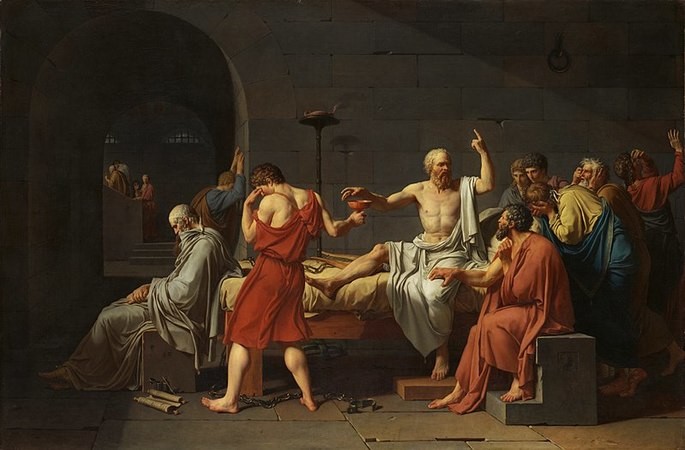Socrates (470 BC-399 BC) was a Greek philosopher , although he was not the first philosopher in history, he is recognized as the “father of philosophy” because he represents the great milestone of Western philosophy.
Socrates Biography
Socrates (c. 469-399 BC) was born in Athens, which in the middle of the 5th century BC became the metropolis of Greek culture.
Little is known about his childhood apart from his poor origin. He was the son of a sculptor, Sofronisco, and a midwife, Fenarete, from whom Socrates would take the idea of childbirth for his way of doing philosophy.
A made man, he drew attention not only for his intelligence but also for the strangeness of his figure and his habits. Big-eyed, bulging eyes, broken clothes, and bare feet, he was considered the ugliest man in Athens.
He used to spend hours in his thoughts. When he was not meditating alone, he talked to his disciples, trying to help them in the search for the truth.
At that time, the second phase of Greek philosophy began, known as Socratic or anthropological, where Socrates was the main philosopher of that period of ancient philosophy . In this phase, philosophers became concerned with problems related to the individual and the organization of humanity.
They began to ask: What is true? What is good? What is justice ?, since in the first phase of Greek philosophy the concern was with the origin of the world, a phase that became known as the pre-Socratic period of philosophy.
Socrates Main Ideas

For Socrates, there were universal truths, valid for all humanity in any space and time. To find them, it was necessary to reflect on them. This perception of truth as attainable is a differentiating factor between Socrates and the sophists .
The principle of Socrates’ philosophy was in the phrase ” Know thyself “, a universal oracle given by the god Apollo in Greek mythology . Before embarking on any truth, man must analyze himself and recognize his own ignorance.
Socrates himself when consulting the Oracle of Delphi received the message that he was the wisest among the Greeks.
Socrates realized that he was wise because, among the wise, he was the only one who thought he did not know and sought true knowledge. From the statement of his own ignorance, the famous phrase arises:
I only know that I know nothing.
Based on this idea, the Socratic Method is developed. The philosopher starts a discussion and leads his interlocutor to the recognition of his own ignorance through dialogue: it is the first phase of his method, called irony or refutation.
In the second phase, the “maieutics” (technique of bringing to light), Socrates asks for several particular examples of what is being discussed.
For example, when asked about courage, he develops a dialogue with a general very respected for his performance in wars. The general (Laques) gives you examples of courageous acts. Not satisfied, Socrates analyzes these cases in order to discover what is common to all of them.
This something common could represent the concept of courage, the essence of heroic acts, which will exist in any courageous act, regardless of the circumstances surrounding it.
The “technique of bringing to light” presupposes a belief by Socrates, according to which the truth is in the man himself, but he cannot reach it because he is not only involved in false ideas, in prejudices, but is devoid of adequate methods.
When these obstacles are removed, true knowledge is reached, which Socrates identifies as a virtue, as opposed to vice, which is due solely to ignorance.
Nobody does evil voluntarily.
The Death of Socrates

Socrates was a celebrated figure in Athens. Wherever he went, he carried an immense amount of followers and disciples, especially young people.
In his encounters with respected figures of the Greek polis , due to his method, he ended up exposing and irritating his interlocutors.
This behavior gave Socrates enemies among the most powerful figures in Athens. Before long, the philosopher was accused of corrupting youth and attempting to attack the Greek gods.
His trial was conducted in two parts. In the first, the vote on his guilt or innocence had a narrow margin in favor of his conviction (280 to 220).
Later, Socrates proposes the payment of a fine as an alternative penalty. This penalty is largely refused and the sentence is in favor of capital punishment (360 to 141).
Socrates accepts the judgment and says goodbye with the sentence:
It is time to go: me to death, you to your lives; who will have the best luck? Only the gods know.
Socrates’ legacy
Socrates did not leave written work, he found the exchange of ideas more efficient, through questions and answers between two people, and he believed that writing stiffened thinking.
There are four basic sources for the knowledge of Socrates: the philosopher Plato , his disciple, in whose Dialogues the master is always the central character.
The second source is the historian Xenophon, a friend and frequent visitor to the meetings that Socrates attended.
The playwright Aristophanes cites Socrates as a character in some of his comedies, but always ridicules him.
The last source is Aristotle , Plato’s disciple, who was born 15 years after Socrates’ death. These sources are not always consistent with each other.

